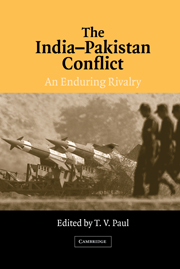Book contents
- Frontmatter
- Contents
- List of figures and tables
- Notes on contributors
- Acknowledgments
- Map: Jammu and Kashmir
- Part I Introduction
- Part II Theories of enduring rivalry and the South Asian conflict
- 2 Theoretical specifications of enduring rivalries: applications to the India–Pakistan case
- 3 The India–Pakistan conflict in light of general theories of war, rivalry, and deterrence
- 4 The India–Pakistan rivalry: prospects for war, prospects for peace
- 5 Realpolitik and learning in the India–Pakistan rivalry
- Part III Roots of the India–Pakistan conflict
- Part IV Conclusion
- Index
2 - Theoretical specifications of enduring rivalries: applications to the India–Pakistan case
Published online by Cambridge University Press: 30 November 2009
- Frontmatter
- Contents
- List of figures and tables
- Notes on contributors
- Acknowledgments
- Map: Jammu and Kashmir
- Part I Introduction
- Part II Theories of enduring rivalry and the South Asian conflict
- 2 Theoretical specifications of enduring rivalries: applications to the India–Pakistan case
- 3 The India–Pakistan conflict in light of general theories of war, rivalry, and deterrence
- 4 The India–Pakistan rivalry: prospects for war, prospects for peace
- 5 Realpolitik and learning in the India–Pakistan rivalry
- Part III Roots of the India–Pakistan conflict
- Part IV Conclusion
- Index
Summary
Introduction
Although there are various conceptual and operational definitions of enduring rivalries, and these may result in different compilations of the phenomena, the India–Pakistan rivalry appears on all lists. From shortly after both states gained their independence in 1947 until the present day, India and Pakistan have clashed repeatedly, with several wars and a larger number of military crises the most notable manifestations of that competition.
To say that India and Pakistan are engaged in an enduring rivalry does not necessarily mean that we understand all aspects of that competition. Nevertheless, there have been several theoretical formulations that seek to explain and predict enduring rivalry behavior. In addition, there is a growing body of research that tests many of the propositions from those models, and we have accumulated some significant knowledge about enduring rivalries. Using these theoretical formulations and empirical evidence, this chapter will examine the India–Pakistan rivalry. Specifically, we will examine the origins of the India–Pakistan rivalry in light of enduring rivalry research, focusing the conditions that led to its initiation and development. We then examine the dynamics of the rivalry, and its patterns of persistence over the last six decades. Although the India–Pakistan rivalry is ongoing, we also consider theoretical and empirical specifications for rivalry termination, with special attention to the prospects of those conditions arising in the India–Pakistan context. Throughout this analysis, special attention is directed to how the India–Pakistan rivalry compares to other long-standing rivalries.
- Type
- Chapter
- Information
- The India-Pakistan ConflictAn Enduring Rivalry, pp. 27 - 53Publisher: Cambridge University PressPrint publication year: 2005
- 6
- Cited by



